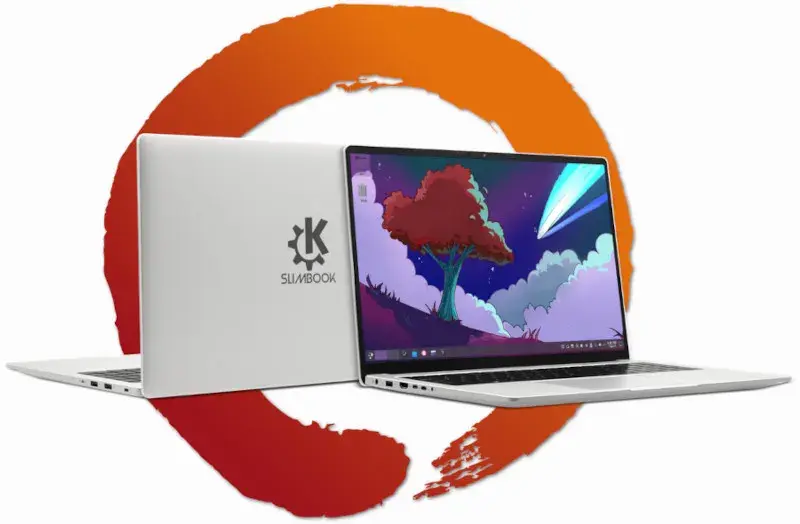Price starts at €999 and releases in April, and will come with Plasma 6.
This is the best summary I could come up with:
The KDE Plasma 6 open-source desktop environment is launching next week and ahead of that the Slimbook V has been announced, the latest laptop crafted in partnership between the KDE project and Slimbook.
This KDE-catered Linux laptop will feature the Plasma 6.0 desktop experience out-of-the-box and is powered by an AMD Ryzen 7 7840HS Zen 4 processor.
The Slimbook V is powered by the 8-core AMD Ryzen 7 7840HS processor with Radeon 780M integrated graphics, features a 16-inch IPS 2560 x 1600 display, up to 8TB of NVMe storage, up to 64GB of DDR5-5600 non-soldered RAM, a 720p web camera with physical switch for privacy, and a 68 Wh battery.
The Slimbook V laptop features a fully aluminum chassis, dual fan cooling solution, and more.
The launch price for this first Plasma 6.0 desktop featuring laptop is €999.
Those wishing to learn more about this newest Linux laptop can do so at kde.slimbook.es.
The original article contains 153 words, the summary contains 153 words. Saved 0%. I’m a bot and I’m open source!
Woah, I’ve never seen a summary at 0% that’s a first for me.
There has even been -1% before
you tried buddy
Lmao saved 0%
The KDE Plasma 6 open-source desktop environment
Makes me wonder, are there closed-source desktop environments for Linux?
Not surprisingly, North Korea’s Red Star OS has a closed source fork of KDE.
You got me curious. I found this.
“An example includes CDE (Common Desktop Environment), which was proprietary until 2012 before it was open-sourced. CDE was used in commercial UNIX versions like Solaris (before it became open source as OpenSolaris) and HP-UX.”
Sounds like the common desktop
😎
Isn’t so common
Android? It’s not wholly closed source similar to RedHat they’ve got closed source elements while using open source elements.
Linux and its kernel are based on GPL and so to distribute something using it would require a compatible license. That means a full distro can’t be anything but open source and actually be distributed in free or paid versions. That doesn’t mean there aren’t closed source interfaces being used personally or undistributed.
MaXX Desktop. A (authorized) clone of SGI’s desktop environment, the developer is trying to make it open-sourced but due to some contractual agreement he has to talk with HPE (which currently holds SGI assets and rights) first and make a new contract, at least this is what he said AFAIK.
IRIX was Unix based with BSD extensions and I believe Maxx Interactive now runs on FreeBSD without Linux compatibility mode. So hopefully it won’t be long before it goes open source. Though I can’t understand why it would be needed outside of anything but nostalgia.
Wasn’t Jolla’s sailfish (for phones) also proprietary? At least the GUI shell?
It’s a good question. I don’t think there are any widely used ones, but I’d bet there are a few running around for internal use.
I think that due to the nature of Linux in general the only ways to have a successful proprietary software package is by being a hardware vendor, owning a whole format that is widely used and needs to be licensed, or having pretty serious multiplatform support. Desktop environments don’t really fall under these.
But I could be way the hell off the mark. I’m just a rambling drunk.
Regarding internal use, if all the users of a piece of software can access the source code by asking to access it, then it’s open source, according to GNU.
Maxed out is 2300€, which is actually a great deal for what you would get. And since you don’t have to choose now without being able to upgrade later, the sub 1000 entry price makes this a really amazing machine. I’ve been looking for a PC to run alongside my MacBook, but as we all know finding the perfect Linux laptop can be difficult.
Still waiting for a Linux laptop with a fingerprint reader… 😔
Framework 13 has a fingerprint reader in the power button.
Ok really stupid question. What os is it? I only know kde to be a DE
Thanks, had no idea this was a thing
Not much different to Kubuntu really. In practice it’s just updated more often with latest Kde patches and has flatpaks enabled




